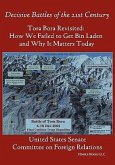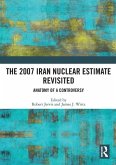In the aftermath of 9/11, President George W. Bush promised a grieving nation that the United States would capture or kill Osama Bin Laden, the mastermind behind the deadliest terrorist attack on American soil. Almost a decade later, the Al Qaeda leader is still alive and free, even after an occupation of Afghanistan by U.S. troops of more than eight years. In November 2009, the United States Senate Committee on Foreign Relations, chaired by John F. Kerry, issued a report on what could be characterized as one of the greatest joint military and intelligence failures of recent American history: Bin Laden's escape from his stronghold in the mountains of Tora Bora, and his subsequent flight to a location that remains unknown. Who was responsible for the decision to put too few troops on the ground, and what justification could there have been for such a decision? What alternative plans were available? What can we learn from the flaws of the Afghan occupation? Anyone interested in current affairs-and especially in the beginning of the Global War on Terror-will find this essential reading.
Hinweis: Dieser Artikel kann nur an eine deutsche Lieferadresse ausgeliefert werden.
Hinweis: Dieser Artikel kann nur an eine deutsche Lieferadresse ausgeliefert werden.








